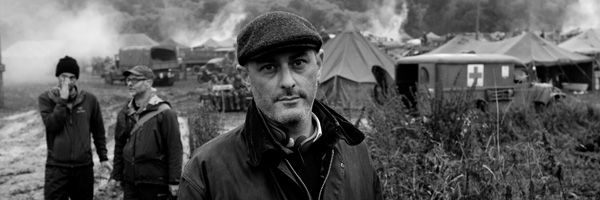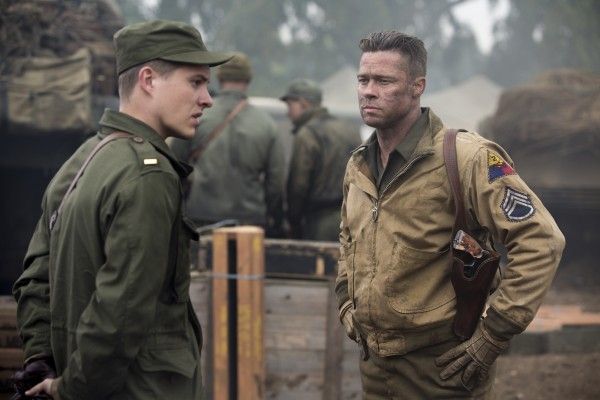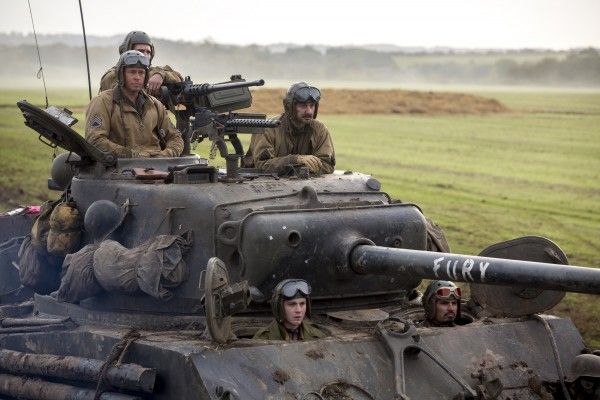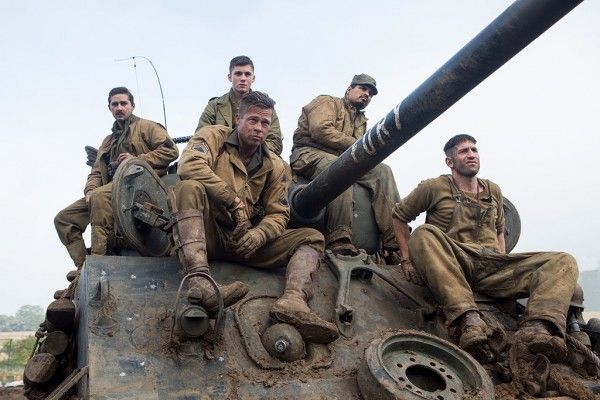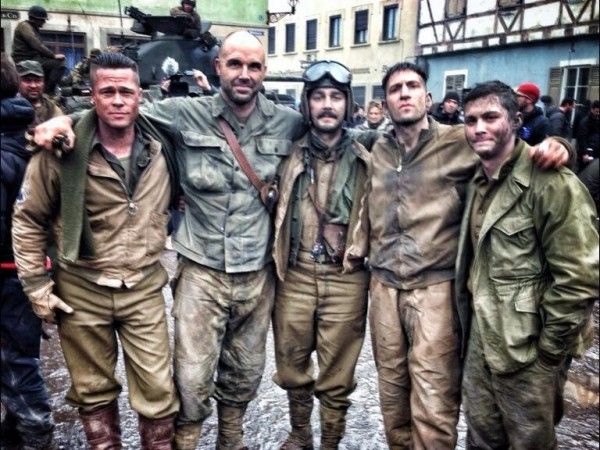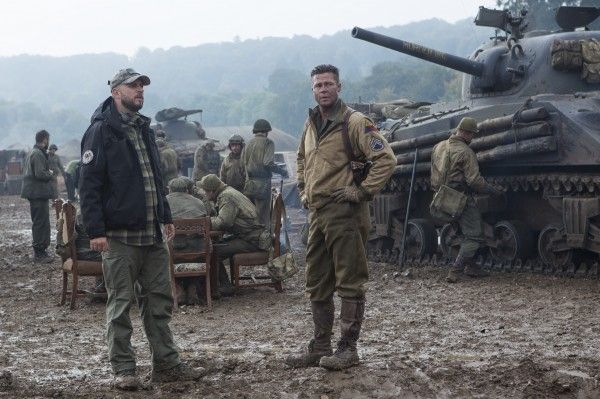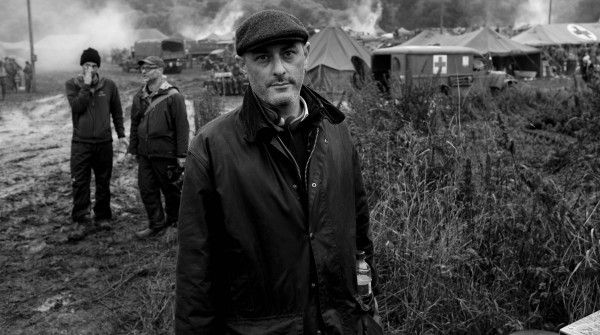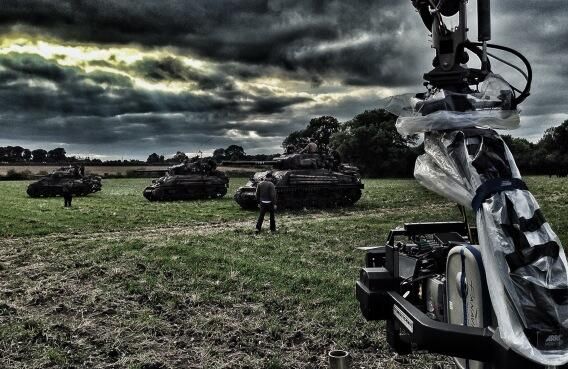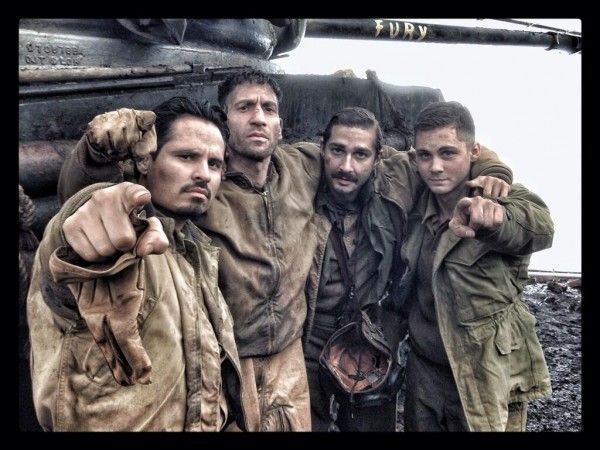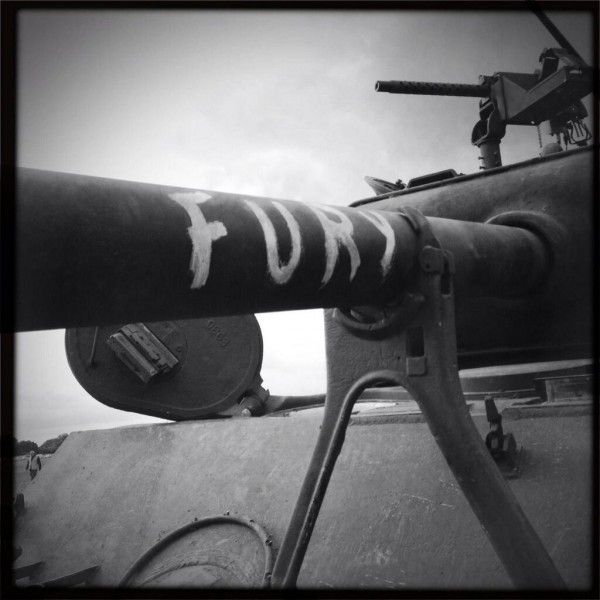A few years ago, I spent a night on the set of David Ayer's End of Watch. While I get to do a lot of set visits, End of Watch was unusual because I was the only reporter on set, and it made for an amazing experience. Not only because I could walk around set without any sort of boundaries, but I got to hang out with Jake Gyllenhaal, Michael Pena, and producer John Lesher between takes and hear them tell great behind-the-scenes stories. What I learned that night was that Gyllenhaal and Pena have a lot of funny anecdotes, and Lesher is an extremely knowledgeable producer that tells it like it is.
Last year when Fury (written and directed by David Ayer and produced by John Lesher) was filming outside London, I got to visit the set with a few other reporters. During the visit, Lesher took us around the muddy terrain and showed us the real tanks being used, the amazing costume department, and explained why Fury is unlike any World War II movie you've ever seen. After giving us an amazing tour, Lesher sat down with us for an in depth interview. He talked about how the amazing cast came together (Brad Pitt, Shia LaBeouf,Logan Lerman, Michael Pena, Jon Bernthal), how Sony got involved, telling a story that takes place over a very long day, why they decided to shoot on film, getting to use a real Tiger tank, and so much more. If you'd like to hear some great stories on how Fury came together, hit the jump.
Before going any further, if you haven't seen the Fury trailer, I'd watch that first.
How did this project come to your desk? How did you get involved with it? And how did it end up at Sony?
JOHN LESHER: For me the journey for this movie started probably a year before we made End of Watch. In fact End of Watch started in a weird way with Fury. I had a meeting with David and he said, "My dream is to tell a movie that no one's ever seen before, a World War II tank movie that no one's ever seen before as authentically and realistically as the men. No one's ever done that I don’t think, and I'd love for you to help me do that.” He pitched me the story and I said, "That sounds fantastic and I would love to do it.” We just started talking and I said, "What are you doing now?” and he said, "Oh, I just wrote a little found footage cop movie.” That became End of Watch. So it was really in a strange way that out of this that we got that, and we had a great time working together. Even before actually we were shooting End of Watch he showed me forty pages of the script for Fury, which he subsequently rewrote and completely changed. Then I went to his office and David was in the Navy, he served on a submarine, but I went into his office and the amount of research that he had done and the amount of thinking that had gone into him, it was so obvious that this was going to – everything in his life was leading up to this point of making this movie. I was so happy that we had such a good time on End of Watch that it worked out really well.
So how did you get with Sony?
LESHER: With Sony - after End of Watch he came into direct this movie called Sabotage, which I was not involved in. Bill Block and QED were developing the script and hired David to come in and direct this movie with Arnold Schwarzenegger and a bunch of other folks. He had a great experience working with Bill and those guys so what happened was when David finished this latest version of this script, and Ethan and Bill worked with David on that movie, so he gave all three of us the script. We all read it and loved it and we stated talking about who should be in it. Our first thought was to make it independently. It's just so much more freedom than getting mired in development at the studio and the way QED works is they do foreign sales and they can also do the gaps so they can fully finance the movie. But when we started thinking about who should be in it and became like, "Wouldn't it be great to get Brad Pitt?” But Brad's someone I've known for a really long time. We gave him the script, he read it in 24 hours and he met with David a few days later. He committed to it and like in a week we'd negotiated his deal.
Then at that point it was obvious to us that we should probably get a partner on the movie so that we had the best of both worlds. We have the independence of an independent doing an independent movie, but we have all the support and distribution and marketing domestically and some of the other main territories that a studio can provide. Sony became our home, but we have all their support and they’ve been great, but they're not in our sandbox all day long. Interestingly we had a meeting with them and we said, "Listen, tell us what you like and what you don't like about the script. All we really want to do is make a great movie.” And they really had no- they loved the script. I mean they really just said, "David, tell us your vision for the movie.” He did and they honestly didn’t have really any significant notes. They had some suggestions and some of them were really good and David made some minor changes, but incredibly minor changes.
So do you feel like you’re making more of an independent movie?
LESHER: Yeah, it feels like we're doing both. The Sony marketing guys- because they have a new head of marketing and he just came out to say hi. And the head of international marketing, because they have all of Europe as well. They respond to dailies and they've been really supportive and great and they gave us a lot of money and we're very appreciative of that.
When Brad Pitt signs on to your movie is there just a leap in the stratosphere that you get to make where everyone’s like, “Okay, we’ll throw you that much more money”?
LESHER: You know, obviously he's the most successful movie star working today, so that does not hurt and I'm sure if we were making the movie with someone else we'd have to make it for less. Exactly what that uplift is I don’t really have any way of quantifying it.
With 12 Years a Slave, he's such a presence in promoting now. It's got to be such an encouraging thing.
LESHER: Yeah, I' m really proud of what he's been able to achieve as a producer. He's really backed films as a producer that he really believes in, like 12 Years a Slave. I haven't seen it yet, but everyone says it’s really powerful.
I don’t know if I would make a movie and watch another one while you’re working on it. It’s probably too stressful.
LESHER: But it’s great I think also for Brad, who has this really successful production company and he started on World War Z that he also produced, and he did 12 Years a Slave, but I think it's also good to balance that out with just acting in a movie and not having the burden of all of that. He's just been such an amazing presence, because he's such a great guy in addition to everything else so that really trickles down. And he and David have such an incredible relationship.
How about the rest of the cast? How did they all come on board?
LESHER: You know, all various different ways. I had a meeting with Shia. I was in New York working on this movie called Birdman and I used to be one of Shia's agents. He was in New York, he had just gotten fired from this Broadway play that he did, and I went and met with him. He called me and said, "Come meet me," and I said, "Of course.” I met with him and he said, "I want to be in Fury ". He had read it and we started talking about it he was like, "I want to do it. Tell David I'll do anything.” So he said he would fly to LA to meet with him. And David's like, "I love Shia, I'd love to meet with him.” They met and David loved him so we cast him kind of from that.
What about Logan? Was it just Perks of Being a Wallflower? Did he read?
LESHER: A couple things. Logan, I met him really early on, I just loved Perks of Being a Wallflower, I thought he was really great. We met all the actors of that generation and read, and then David did readings with all of them and his just really stood out. It was really important to David that the [actor] really be the age the character is, because it's that cusp, that transition from boy to man. There were other great actors that we met with that did really beautiful readings, but he really is in so many respects, the character. He just had it from - it was so weird because in January I'd just been given the script and oddly met with Logan. He came into my office the day I read the script, I'd just finished reading it and he walked into my office. I'm sitting there talking to this kid and I'm thinking to myself the whole time, “Oh my god, this kid could be Norman.” I called David and I was like, "You've got to just meet this kid. I've got a feeling.” Anyway, what really won the day though was his audition for the movie.
Do you see it more as an epic drama or is it more like an intimate thriller?
LESHER: I think it's a little soon to talk about exactly the positioning of the film. I certainly see it as a successful film.
Oh, I didn’t mean how you're going to market it. I mean like the film itself. What is it more of?
LESHER: What is the genre? I think it's a war movie you've never seen before. We keep saying it’s this personal journey of these five men and what they go through.
Is it like End of Watch in that way, where that was a cop movie you've never seen before?
LESHER: I think so. I think a little bit, but I think also obviously a lot bigger canvas. And also, it's a father/son story in many respects. It's that mentor/mentee thing.
So that's Brad Pitt and Logan Lerman, that father son thing?
LESHER: Yeah. I mean, if you look at the themes of David's work whether it's Training Day or End of Watch, he likes to tell stories about these guys and what they go through. This has very similar thematic resonance to some of his other work.
You have an ensemble cast. Does everyone have pretty much the same amount of screen time?
LESHER: I would say it's really like Brad and Norman's movie per se, but it's really about these five guys in this tank. So everyone has these really great moments and they're part of this thing that happens and they're all really important. But in many respects it's the story of Norman's journey with these guys; they kind of give him their wisdom. I'm not going to spoil the movie, I'm not going to ruin the whole movie for you, but they're sort of doomed characters and he has to live with the knowledge and the wisdom that these four other men give him.
Is there like the toughest day of shooting coming up or has that already passed?
LESHER: It's always hard to know, because what does it mean? What is a tough day? Logistically we have really hard days. Literally on our first day of shooting we had 350 extras, which is- David's got so much energy and is so prepared that I would say with most directors you would never even attempt to do something like that, but he did it and rose to the occasion in such a big way.
Until I found out it was all in a single day I thought there would be a bunch of big war scenes.
LESHER: There are a bunch of big war scenes.
So this is one single very busy day.
LESHER: Yes. I don’t think you're going to be so attached to exactly what the time of the movie is. So I don’t think you're going to be sitting there going - I think it's more you're with these men on this story.
And obviously very condensed.
LESHER: Yes, condensed.
You guys are filming with film.
LESHER: Yes, which is really great. Turns out film looks better [laughs].
Can you talk about if there was a lot of debate between film and digital?
LESHER: The original idea that David had was to shoot it in color on film with anamorphic lenses and that's what we're doing. In the middle of that we said; let's test out some of these digital cameras - the Alexa, the Sony, this one, that one. They all look really good and all for really different reasons, but for so many aesthetic reasons this really felt like the right tool for this movie. If you're shooting in really little light some of these digital cameras are fantastic, for night work and things like that, but there's something about the handsome - just the beauty of real film that just made it what we all felt strongly was the right choice. But we’re shooting in color so it's not like- you know a lot of times you see these World War II movies and they kind of do like a sepia tone or pseudo black and white. All the photography that we have is in black and white and when you talk to these man who were in battle they describe their real life as black and white and they describe the war as full color. So it was really important to David, this was like Dorothy in Oz not in Kansas, so it was really important to David that it had the vividness that the men describe when they were at war. So that’s why we wanted to shoot it in color.
Is he going to a more traditional style as opposed to something like End of Watch that was more handheld with cameras in certain places?
LESHER: It’s similar and different. It’s meant to be an immersive experience told from the point of view from the guys, so that’s a lot like End of Watch, but it’s not jerky cameras or shaky handheld cameras. We have dolly tracks and Technocranes and hard mounts and beautiful cameras on sticks. We want to show you what it felt like to be on this tank going through Nazi Germany and what it feels like to be in the war, but at the same time have beautiful camerawork and stuff like that.
How much do we get to know the other tanks?
LESHER: You get to know the other Love Company tanks, that’s what they called them, called Love company and you get to know them a little bit, but really you’re with these five guys.
With the DP and the behind the scenes, did David bring in his people?
LESHER: Yeah, Roman Vasyanov, who’s this fantastic young Russian DP shot End of Watch. He’s our cinematographer on this film. He didn’t shoot Sabotage though. There’s a lot of people that he used on End of Watch and there’s a lot of new people. One of the great things about shooting a movie here in the UK is there great, there are just great artists and technicians and below the line people and actors and everything. So some of what we did is utilized, some of the people he’s worked with before. Andrew [Menzies], the production designer, is a new collaborator. Our first AD is, fantastic, this guy Toby Hefferman just worked on World War Z and Jack Ryan. There’s just fantastic people that work here locally that we use. So really Roman and me and a few others but most of the people - and Dody Dorn, his editor, edited both End of Watch and Sabotage.
Was this really the only place you could shoot it? You’re not going to Germany?
LESHER: For a whole host of reasons we decided to come here. For one, all the assets are available in Europe so there’s a lot here. The weather, Andrew talked about it, it was the wettest, most horrible weather. But the idea of shooting or Germany or Romania or Bulgaria or somewhere like that, it would get really really really cold. So as kind of wet and cold as it gets here in England it’s not nearly to the extent that you do as you go further east. And the light, you get this beautiful northern diffused light, which is really great. And we’re here for the mud [laughs], which you guys got a good little taste.
It it like a huge line in the budget? Mud costs?
LESHER: We’ve probably spent more money on mud than anything [laughs].
The score is going to be really important. Do you know who’s doing it?
LESHER: We’re not ready to announce it, but we’re talking to somebody really fantastic right now. We just haven’t made this deal yet.
So by the time we file our stories it will be all worked out.
LESHER: Yeah, there’s someone really – and also someone from Europe. And also there’s a great tax incentive here in the UK as well, which is why there are so many movies currently shooting here. We’re really lucky though, because we’ve been working on this movie for a long time so we really got in early and hired all the best people, so there! [Laughs]
So you guys are here in this field for seven weeks and then you go somewhere else?
LESHER: Yeah, we go about an hour from here.
How many more weeks?
LESHER: Eight.
What are you guys shooting an hour from here?
LESHER: We built a whole German town there and we’re shooting a couple of the different battle scenes there. The big set that we built there is - they roll up on this German town and the square of the town is something that we’re building and an old runway of an old air force base.
Is that a real runway or did you guys build it?
LESHER: It’s a real old runway. It’s not currently in use. But they shoot sometimes there, like they shot some of the driving of Fast and Furious there. It’s a really interesting place.
The finale is all in that one farmhouse that we drove past?
LESHER: The finale of the movie is a battle scene at the crossroads. So that farmhouse, which is a barn, it burns to the ground, so that is in the shot basically. But it’s actually in the tank and outside of the tank and it’s at night.
You mentioned there’s a love story involved. Can you talk a little bit more about that?
LESHER: Yeah, one of the things that happens in this movie is that they roll up in this German town and they see all the crazy things that happen in this town. Wardaddy takes Norman into this apartment and it’s almost like this fantasy, like they’re playing house and they have bacon and eggs and there’s two beautiful women. Norman meets this girl Emma and he becomes a man.
What does that?
LESHER: I don’t know, I’m still figuring that out [laughs].
Is she an older girl?
LESHER: No, she’s someone his age. It’s sort of like this idea of - there’s so many different ideas that David has embedded in the script, but it sort of give you an idea of what he would be doing if he weren’t here, what’s lost and what happens in war. There’s also some beauty in it too. There’s some connection there. It’s not just some primal act or something. It’s sweet.
Have you cast her?
LESHER: We’ve cast this really - I can’t remember what her name is, this German actress and her aunt as well is this great theater actor here in London who’s playing her aunt who also has a really great scene with Brad.
Is there a war movie from any war, not just World War II, that you guys think this is taking a similar approach to. Like Apocalypse Now where a bunch of people are trapped on the boat.
LESHER: Obviously Apocalypse Now is one of our favorite films.
Yeah, of course you don’t compare yourself in quality, but you can be inspired by it.
LESHER: Yeah, I think that there’s a lot of war movies that we’re inspired by. I think there are some obvious parallels I guess to Apocalypse Now in terms of the journey into the heart of darkness, except Colonel Kurtz is in the tank with the Martin Sheen character. I think it’s a little soon to…but one of the things that was really inspiring to David was that he hadn’t really seen his version of this movie before. I doesn’t sugar coat it and they’re real guys, they’re not like these archetypal characters that sometimes you see in some of these movies where you don’t feel like they’re real, you just feel like they’re represent some archetype of something.
Often things change along the way in terms of script and dialogue, how much has changed along the way on this? Or has it pretty much been sticking to the script?
LESHER: See one of the things that I love most about David as a filmmaker is that he’s such a great writer. It sticks pretty close to the script. There might be a little bit of improvisation, but that’s been improvisation that they worked out through the rehearsal process like we did on End of Watch, which pretty much stuck to the script and if there were little things here and there which weren’t they were all things that David sanctioned. What’s great about that is that we’re not finding it really on the day so much as everyone kind of knows what they’re doing and they’re doing it. So it’s great. Around the edges there are little things here and there, but mostly it’s 100% David’s script.
Were the rehearsals all roundtable style?
LESHER: A lot of different things, but mostly just working in David’s office and however they were doing it was really private between David and his actors and they had this really private little space they created for themselves to work.
For more from my Fury set visit:
- 30 Things to Know About David Ayer's FURY From our Set Visit, Plus New Images
- Director David Ayer Talks FURY, Telling a Different WWII Story, Cast Boot Camp, Reshoots, Using Shia LaBeouf as His "BS Detector", and More

